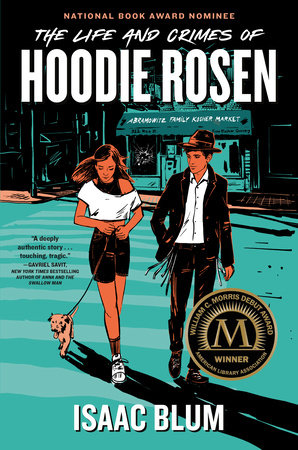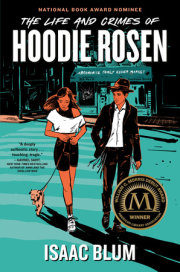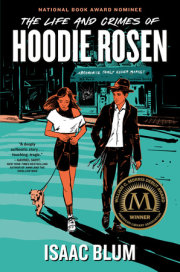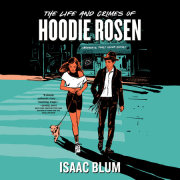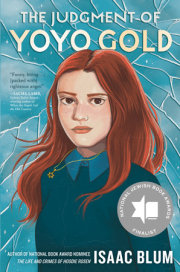CHAPTER 1
in which I celebrate Tu B’Av by taking the first step toward my own ruination LATER, I TRIED TO EXPLAIN to Rabbi Moritz why it was ironic that my horrible crime was the thing that saved the whole community. He didn’t get it, either because he was too angry, or because his head was filled with other thoughts, or because the man has no sense of humor.
I don’t think it’s funny now—it ruined my life, put me in intensive care, and humiliated me and my family on a global scale. But I found it funny at the time.
It all started on Tu B’Av, which is one of the more obscure Jewish holidays. I’m Orthodox, but even I couldn’t recall what the holiday was about. I only remembered when I looked out the window and saw the girl in white. She was on the sidewalk across the street.
I was in halacha class, learning about Jewish law. We were talking about ritual hand-washing. Rabbi Moritz paced back and forth in front of the whiteboard, reading from the
Shulchan Aruch, making the occasional Hebrew or English note on the board.
I was a little distracted because Moshe Tzvi Gutman was slurping cereal next to me, and a little distracted because Ephraim Reznikov was reading his copy of the
Shulchan Aruch out loud but out of sync with Rabbi Moritz. But I was mostly distracted trying to remember what the heck Tu B’Av was about.
I couldn’t ask my buddy Moshe Tzvi because he would make fun of me for not knowing. Moshe Tzvi studies really hard, and he makes you feel like an ignorant schmuck if you aren’t as learned as he is. So I just stared out the window as though the answer would be out on the street. And then it was.
Because now the girl was dancing, making various motions with her hands, swinging her body around in little circles.
Which made me remember that Tu B’Av had something to do with dancing girls and the grape harvest—the grape harvest was pretty big back in biblical times. During the grape harvest, all the unmarried girls of Jerusalem went out into the vineyards where the harvest was happening, and they danced, wearing only plain white robes. Because all these girls were wearing plain white robes, the boys didn’t know if the girls were rich or poor, or even which tribe they were from. It created a level playing field, and the boys could choose a wife without thinking about if she was poor, or if she was from some undesirable rival tribe.
The girl outside wasn’t wearing a white robe, because it was the twenty-first century. She wore a white T-shirt, its short sleeves revealing skinny arms. The shirt ended just above a pair of shorts that left most of her legs exposed. The legs ended at a pair of white Adidas sneakers, striped blue.
She was dancing. But why was she dancing? There was nobody on the sidewalk with her but a small white dog. I thought it was strange behavior, but maybe gentile girls danced for their dogs all the time. I had no idea. I wasn’t supposed to look at gentile girls. I guess there were Jewish girls who dressed that way too, but certainly not any I knew. And if she was a Jewish girl dressed like that, I wasn’t allowed to look at her either.
When she stopped dancing, she walked over to the base of a tree, bent down, and picked up a cell phone. Maybe she’d recorded her dance? She stood up, looked over, and made eye contact with me. Or, I thought she did. It was hard to tell from that distance, but when she looked up at me—or at the school—I reflexively looked away, up at the board, at Rabbi Moritz. The contrast between the girl and the rebbe couldn’t have been starker. He wore a heavy black suit and had an enormous beard. And Moritz was spitting as he talked. He had a little bit of saliva on his upper lip.
“Why, according to the text,” the rebbe asked, “must we wash our hands upon rising in the morning? Why, before we walk four cubits, must we wash?”
Reuven was all over it. “We have left the chance for evil spirits to come onto us in the night. So we wash them off, the spirits.”
“Amazing. As Reuven said, we have left ourselves vulnerable,” Moritz went on, his voice rising to “vulnerable,” pausing, then descending, “not only to the spirits of evil, but what else?” His voice rose again, and the question came out in a high-pitched squeak. “What else?”
Reuven again: “The spirits have come and, depending on how you read it, our souls have departed, right?”
“Correct. Our souls have departed through our hands. Through cleansing, and through the Modeh Ani prayer, our souls return and we are ready for service of HaShem.” Everything Moritz said came back around to servicing God.
“What if you wear gloves?” asked Moshe Tzvi. He was still working on his cereal, but he paused to gesticulate with his plastic spoon, spraying little drops of milk across his desk. “You know, while you sleep. Must you still wash?”
Rabbi Moritz paused in his pacing. “This is a good question,” he said. “I would say, based on the text, that the gloves would keep your soul in your body. Though of course this would be impractical, sleeping in gloves.”
“Okay,” Moshe Tzvi said, scratching his bare chin. “Now what if the gloves have a small hole in them? What are the dimensions of the soul? And how . . . squeezy is it?”
“I think the question is not how big the hole is in the gloves, but whether or not the wearer of the gloves is
aware of the hole,” said Rabbi Moritz.
This is always the question. Judaism has rules for just about everything, from how to slaughter your animals, how to watch television without violating Shabbos (our Sabbath, our day of rest), to when and for how long you have to refrain from eating on fast days (of which there are many). But the trick is that you only have to follow the rules if you know about them. If you’re a Jew, but you don’t
know you’re a Jew, you don’t have to follow
any of the rules. It’s like if you went to Walmart and stole a bunch of things, and then the police came and they were about to arrest you, and you were like, “Wait, I didn’t
know it was illegal to take this stuff without paying,” and the police were like, “Oh, okay, our apologies. Have a good day. Enjoy the free TV.”
I had a question for the rebbe, but I was too busy staring out the window, and it slipped away. So too had the girl—she wasn’t there anymore.
“What if the hole is pretty big?” Moshe Tzvi asked. “Big enough that you can’t plausibly deny knowing about it? Maybe you turn your hand over so you can’t see the hole, but you can feel that it’s there.”
“Then you have to wash.”
Rabbi Moritz picked his book back up, and was about to turn the page, but Moshe Tzvi wasn’t satisfied. “What if Hoodie is sleeping in his gloves, and he knows there’s a hole in his glove, but then I bash him over the head with a very heavy piece of pipe, and he forgets about the hole in his glove due to his head trauma?”
Rabbi Moritz considered, nodding his head a few times in a slow rhythm. “It would depend on his state of mind upon awakening, after he’s slept. Can we move on?”
“No,” said Moshe Tzvi. “We haven’t talked about sleeping in mittens.”
“Oy, Moisheee.”
Moritz did move on. Now he was talking about the handwashing itself, how to do it right. I wasn’t listening, partly because if I didn’t know the right way, I could do it how I wanted. But mostly I wasn’t listening because I was too distracted, staring out the window, looking for the Tu B’Av girl in white. Now that she’d disappeared I couldn’t be sure that I’d seen her at all. She could have been just a figment of my imagination, a physical manifestation of my thoughts about Tu B’Av, what my mind thought a dancing tribeless grape-harvest girl would look like today.
I had to know for sure.
I got up from my desk. Moshe Tzvi handed me his Styrofoam cereal bowl as I walked by. I left the room, slurping the sweet leftover milk. I tossed the bowl in the can outside and put on my black hat.
When I took walks, I always liked to wear my suit jacket and hat. I wanted to look sharp and distinguished. “Respectable” was the word my dad always used.
It was still summer, and the neighborhood smelled like grass clippings. I could hear the buzz of a distant mower. A welcome breeze swayed the trees that lined the streets.
Usually I walked slowly, lost in my thoughts. I paid no attention to where I was, or where I was going. But today I moved with purpose, walking the grid of streets in a systematic fashion, making sure I at least glanced down every road.
I saw her on Cellan. She was pulling at the leash, trying to drag the dog along, but the little thing had found an interesting scent at the base of a tree, and he was digging in, keeping his weight low, trying to hold his ground.
I walked toward her slowly, growing more and more nervous with each step. I’d never spoken to one of the neighborhood girls. Yeshiva students aren’t allowed to talk to girls, let alone girls dressed like this one. I didn’t really
want to talk to her. It was more like I
had to. I was drawn toward her, as though pulled by some kind of sci-fi tractor beam.
It was Tu B’Av. She was dressed in white. Maybe this was what God wanted from me.
She was too busy struggling with the dog to see me approach. I tried to think of a clever way to start a conversation. “Um,” I said. After weighing many outstanding options, I’d decided “Um” was the best choice.
“Oh,” she said, and looked up.
The dog took the opportunity to scramble toward the tree, sniffing it audibly. While the girl stared at me, the dog peed on the tree.
The girl looked at me like I had eight heads.
“Nice hat,” she said.
She had deep brown eyes, and jet-black hair pulled up in a scrunchie.
“Thanks,” I said. “It’s a Borsalino.” The hat was my most prized possession, a bar mitzvah gift from my parents. When she didn’t respond, I told her the hat was Italian.
“Okay,” she said.
I shifted my weight uncomfortably. I was sweating. The breeze had died and it was blazing hot out, so maybe that was it.
I wanted to get away. I could tell that she did too. When the dog started pulling on the leash, a look of relief appeared on her face, and she took a step away from me.
“What’s the dog’s name?” I asked. I hadn’t meant to ask. I’d meant to say nothing. I’d meant to let her walk away so I could peacefully live out the rest of my life without ever feeling this uncomfortable again. But I’d spoken, almost against my will.
“Borneo,” she said. “Like the island.”
I’d never heard of Borneo, but I didn’t want her to know that. “Oh yeah,” I said, “the island. In the . . . ocean.” That’s where the islands were, right? In the ocean. “What’s your name?” I asked before I could stop myself.
“Anna-Marie.” And she gave a last name too, Diaz-something, but I missed it.
“Crap,” I said. I basically didn’t have any control over my words at this point.
“Huh?” she asked.
When I asked her name, I’d been holding out hope she’d be a Chaya or an Esther. But no. She was an Anna-Marie. Just Anna would have provided a sliver of hope. I knew from the shorts that she wasn’t super observant, definitely not frum, like me. But unhyphenated Anna could have been a Jew at least, if a secular one. Some secular Jews lived in the area. There was a reform synagogue and a delicatessen in the next town.
But Anna-
Marie? There literally wasn’t a more goyishe name.
When Anna-Marie moved her arm to pull on the dog’s leash, a cross appeared above the collar of her shirt. It jumped back and forth on a silver chain just above her bare collarbone. I watched it in despair.
She moved to leave again.
“I’m Hoodie,” I said.
“Hoodie?”
“Like the sweatshirt.” I motioned as though to pull a hood over my head.
Anna-Marie reached out to shake hands. I looked at her hand. She had slender fingers, each nail carefully painted an aquamarine color. Aquamarine. Anna- Marie. I wanted to shake Anna-Marie’s aquamarine hand desperately. I looked behind me to see if anybody was watching. Nobody was. But I still couldn’t do it. I was a bar mitzvah, and I wasn’t married to her, so I wasn’t allowed to touch her. I just stared at her hand until she took it away.
“Okay, Hoodie. Borneo and I are gonna go.”
“Do you live around here?” I asked.
“No. I took an Uber here to walk the dog.”
I laughed, and some of the tension melted. “Stupid question,” I said. “It was good to meet you, Anna-Marie.”
She took a step away, then turned back. “Hey,” she said, and she took out her phone. “What’s your Insta? I’ll follow you.”
I knew she meant Instagram, a picture app people had on their smartphones. I wasn’t allowed to use it, but I didn’t want her to know that. I reached into my pocket and took out my phone.
When she saw it, Anna-Marie broke into a huge smile. It lit up her whole face. Then she started laughing. “You have a
flip phone?” she asked. “Wait, wait. Hold on. I have to snap this. Cassidy will
never believe it.”
I smiled for Anna-Marie’s picture, feeling good that she was interested in me. Because I was interested in her. Her fingernails. Her whole-face smile.
“This is so cute.”
She thought I was cute. I smiled at her. I thought she was cute too.
“The phone,” she clarified. Not me. “Look how
small it is. It’s like a little baby phone. You know,” she said, still laughing, “my nana has a flip phone too. You guys should hang out together. You can send each other predictive text messages, and read books with giant print.” Now Anna-Marie’s laughter was getting the best of her. “You guys could go out to dinner at four o’clock and read the menu through magnifying glasses and, like, talk about knitting patterns.”
I was aware that I was being made fun of. I should have been upset. But I wasn’t. I was ready to hang out with Anna-Marie’s nana. I would absolutely go out to dinner with her nana, so long as it was a kosher restaurant. I’d make sure to brush up on my knitting, so our conversation would flow. Hopefully Anna-Marie would come too, and she could mock me incessantly while I sweated through layer after layer of clothing.
“Awesome,” I said. “Tell her to give me a call.”
Anna-Marie just waved goodbye. I watched Borneo drag her down the block. She disappeared around the corner onto Rhyd Lane.
Copyright © 2022 by Isaac Blum. All rights reserved. No part of this excerpt may be reproduced or reprinted without permission in writing from the publisher.

